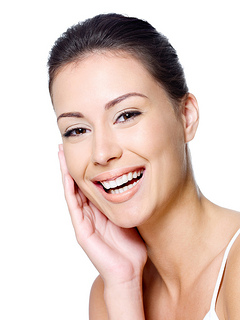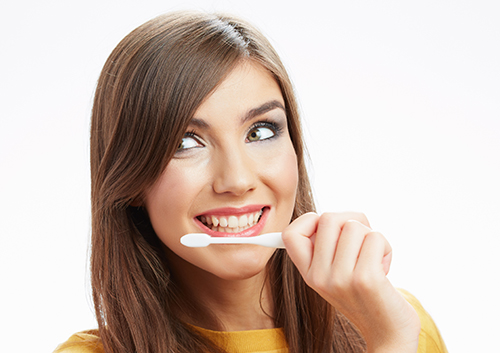
The American Academy of Periodontology stresses the importance of good oral health since gum disease may be linked to heart disease and stroke. Thus far, no cause-and-effect relationship has been established, but there are multiple theories to explain the link between heart disease and periodontal disease. One theory suggests that oral bacteria may affect heart health when it enters the blood and attaches to the fatty plaque in the heart’s blood vessels. This can cause the formation of blood clots. Another theory suggests the possibility that inflammation could be a contributing link between periodontal disease and heart disease. Gum disease increases plaque buildup, and inflamed gums may also contribute to the development of swollen or inflamed coronary arteries.
What is coronary artery disease?
Coronary artery disease is caused in part by the buildup of fatty proteins on the walls of the coronary arteries. Blood clots cut off blood flow, preventing oxygen and nutrients from getting to the heart. Both blood clots and the buildup of fatty proteins (also called plaque) on the walls of the coronary arteries may lead to a heart attack. Moreover, periodontal disease nearly doubles the likelihood that someone will suffer from coronary artery disease. Periodontal disease can also worsen existing heart conditions, so many patients who suffer from heart disease need to take antibiotics before any dental procedures. This is especially true of patients who are at greatest risk for contracting infective endocarditis (inflammation of the inner layer of the heart). The fact that more than 2,400 people die from heart disease each day makes it a major public health issue. It is also the leading killer of both men and women in the United States today.
What is periodontal disease?
Periodontal disease is a chronic inflammatory disease that destroys the bone and gum tissues around the teeth, reducing or potentially eradicating the system that supports your teeth. It affects roughly 75 percent of Americans, and is the leading cause of adult tooth loss. People who suffer from periodontal disease may notice that their gums swell and/or bleed when they brush their teeth.
Although there is no definitive proof to support the theory that oral bacteria affects the heart, it is widely acknowledged better oral health contributes to overall better health. When people take good care of their teeth, get thorough exams, and a professional cleaning twice a year, the buildup of plaque on the teeth is lessened. A healthy, well-balanced diet will also contribute to better oral and heart health. There is a lot of truth to the saying “you are what you eat.” If you have any questions about you periodontal disease and your overall health, give our Manasquan office a call!

Dr. Skelian and Dr. Aptaker and our team know it is natural for you to feel some concern when you need to wear any type of dental device to correct a problem with your teeth. Both braces and Invisalign can produce good results in giving you the smile you’ve always wanted. Both methods can straighten your teeth and alleviate such issues as crowding, spacing, cross bite, overbite, and underbite. Both methods of treatment have a similar cost.
You can take a cross-country road trip in a ten-year-old economy car or you can make the trip in a brand-new luxury sedan. Both will get you to your destination, but you will be far more comfortable traveling in the luxury sedan. Similarly, your journey to a great smile is much more comfortable and convenient with Invisalign as opposed to braces.
Comfort
Some of the discomfort you may experience with braces is greatly reduced with Invisalign. Because Invisalign is custom-fit to your mouth and made of plastic, you will feel less pain, irritation, and soreness. Unlike braces, there are no food restrictions; you can eat anything that is on your diet.
Brushing and flossing
Of course you will want to brush and floss your teeth to prevent plaque buildup, tooth discoloration, and dental decay. If you wear braces, these simple tasks can become quite a challenge. Invisalign aligners are very easy to remove and replace, so you can brush or floss like normal without having to work your way around any metallic framework covering your teeth.
Appearance
You do not have to be embarrassed to show your teeth when you are using the Invisalign system. Since the aligners are practically invisible, no one will even notice you are wearing them! Whether you are a teenager or an older adult, you can live your life normally.
If you want to learn more about Invisalign, or are wondering what your treatment options are at Squan Family Dentistry, feel free to give us a call at our convenient Manasquan office!

Invisalign, which we happily provide at Squan Family Dentistry, is a great alternative to traditional orthodontic treatment if you’ve been apprehensive about the thought of metal braces. During your initial visit, the first thing we do is take an impression of your teeth as they are now and digitize it. Using special software, we look at the current positioning of your teeth and compare it to the way your teeth should look.
Invisalign treatment, which consists of a series of aligners that you switch out approximately every couple of weeks, can help patients with crowded teeth, crossbites, overbites, underbites and more. Invisalign gradually shifts your teeth into place, creating the dazzling smile you’ve always wanted. During treatment with Dr. Skelian and Dr. Aptaker, patients wear the aligners all day and night, except for during meals and when they’re brushing and flossing; cleaning your teeth and eating are a snap since you can easily remove your aligners! And because they’re clear, no one will know that your teeth are steadily straightening!
To find out if you are the right candidate for Invisalign treatment, we invite you to give us a call at our convenient Manasquan office and schedule a consultation.

Getting your braces off is exciting. You’ve been working on your new smile for months or years, and it’s time for the trips to our Manasquan office to pay off. Can you imagine how bad it would be to discover that your teeth are straight, but that there’s decay?
Caring for your smile while wearing Invisalign goes beyond just waiting for your teeth to get straighter. It involves cleaning your teeth regularly and thoroughly to prevent tooth decay. That way, your smile will be more beautiful than ever when you’re done with your Invisalign treatment.
Take Your Trays Out
The first difference you may notice between Invisalign and traditional metal braces is that Invisalign aligners are invisible, but there’s another important distinction as well. Invisalign braces are removable. You can take the trays out, and you should. Remove the trays while you’re eating so you don’t get food stuck in them. Also, remove them while you’re cleaning your teeth so that you can have full access to all the nooks and crannies in your mouth.
Brush Normally
The guidelines for brushing your teeth with Invisalign don’t change compared to braces. Brush your teeth at least twice a day using a soft toothbrush and a fluoride toothpaste, being sure to get all surfaces of your teeth. If possible, brush after each meal.
If you can’t, be sure to drink some water and swish it around in your mouth when you’re done eating to get rid of the extra food on your teeth. Leaving carbohydrates, such as sugar and starch, on your teeth opens the door to tooth decay.
Floss and Wash
Flossing your teeth gets out the bits and pieces stuck between them. It’s a time-consuming task when you need to navigate the wires of traditional metal braces, but thanks to Invisalign’s removable design, flossing is no problem. Rinsing your mouth with a fluoride antibacterial mouthwash also helps clean your teeth because it gets into all of the spaces. Floss and rinse one or two times daily.
Cleaning Your Trays
Cleaning your Invisalign trays keeps them from getting riddled with bacteria, and it helps keep your teeth free from excess food. You can use the Invisalign cleaning system, which involves placing the trays in a tub with cleaning crystals. The plastic trays are clean after 15 minutes. You can also ask Dr. Skelian and Dr. Aptaker for other ways to clean your trays.